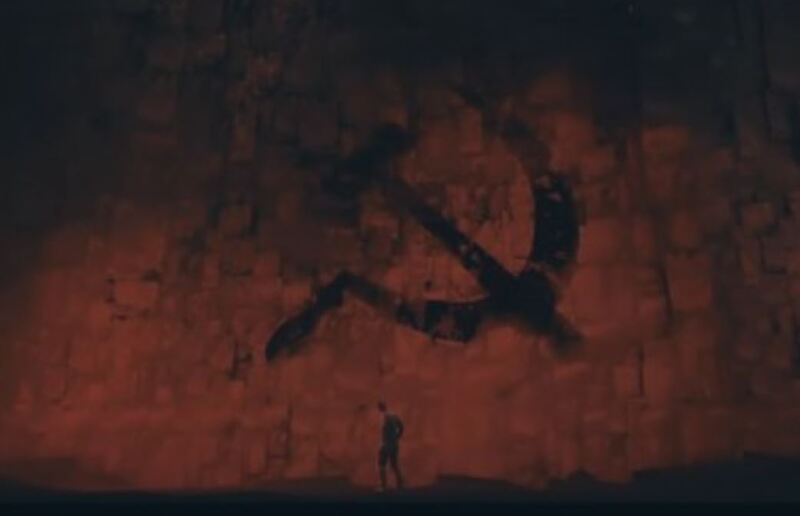The Communist historical propaganda was realised on several levels. Apart from spreading lies and covering personal stories, one of its tools was the deformation of language. Many parents and grandparents – often unconsciously – teach their children and grandchildren the twisted language which they were taught during the Communist era. We’re undoubtedly deeply embedded in a crisis of terms.
In totalitarian regimes, especially in the Communist one, falsification and twisting of terms was of key importance. It enabled it to create a fictional reality. When we’re calling a systemic lie “elections”, the usurped Communist administration – “Polish authorities” or “people’s power”, and Communist totalitarianism – “socialism”, then we’re using words which are falsifying the historical reality. We’re spreading the Communist propaganda.
“Liberation” was a key word in the Communist arsenal of lies. It became the foundation for all further falsifications leading to apparent legitimisation of power forced down on us by the neighbouring eastern force. It is also a term of shocking vitality.
The following article is based on a series of texts aiming to point out the fact that we’re still accepting the alphabet of the language of disinformation, thus deepening the historical duality.
One of the most prevalent lies in the public language is the term “liberation” describing the conquest of Poland by the Red Army. What’s important, is the fact that this term was coined by the propaganda of the Communist times to describe the years 1944-1945, and yet it still used to this day in the same context. It is; after all, used by the Russian Federation as part of its historical propaganda aiming to legalise Kremlin’s offensive actions taken more than 70 years ago against the central-eastern Europe. Therefore, it is an important part of another propaganda term – the so-called Great Patriotic War.
After 1944, the Soviet Union took the Polish Borderlands subjecting them to rapid Sovietisation; repressed the constitutionally chosen officials of the Polish Underground State and the soldiers of the Polish Armed Forces working in conspiracy or under the Home Army (including its leaders); pacified the Polish society on both sides of the river Bug using the Soviet army and repression apparatus; forced a totalitarian political system on Poles as well as government officials completely dependent on Moscow – working for the imperial interests of the Soviet Union in opposition to the Polish national interests.
The annexation of almost half of the country, eradication of rightful authorities, repressions of the soldiers of the Polish Army, forced relocations deep into the Soviet Union, pacifications, ruling of “post-Yaltan” Poland by the Soviet nominees – it’s only some of the historical facts which paint a picture of what occurred in 1944-1945 and after. Poland was not liberated, but became the subject of aggression and conquest from the hands of the Soviet Union.
“Liberation” was a key word in the Communist arsenal of lies. It became the foundation for all further falsifications leading to apparent legitimisation of power forced down on us by the neighbouring eastern force. It is also a term of shocking vitality. Even though, more and more Poles understand that in the years 1944-1945 Poland became enslaved once again, still we can’t seem to find it in ourselves to name what happened to our ancestors as it was. Because of this, some historians and columnists attempt to use the term “liberation” in quotation marks.
This stressing of distance is definitely better than mindless copying of Communist propaganda. However, it often seems as if this form of contesting the false term is not a solution, but rather an expression of helplessness. After all, it is still a way of preserving it in our description of the events. What stops us from reaching into the dictionaries and writing directly that Poland was conquered by the Red Army? A dictionary definition of a conquest is indeed “the subjugation and assumption of control of a place or people by military force”. That was the process we had to face in 1944-1945. As well as aggression defined as “the invasion and assumption of control of one state by another”. The annexation of almost half of the country, eradication of rightful authorities, repressions of the soldiers of the Polish Army, forced relocations deep into the Soviet Union, pacifications, ruling of “post-Yaltan” Poland by the Soviet nominees – it’s only some of the historical facts which paint a picture of what occurred in 1944-1945 and after. Poland was not liberated, but became the subject of aggression and conquest from the hands of the Soviet Union.
Many parents and grandparents – often unconsciously – teach their children and grandchildren the twisted language which they were taught during the Communist era. We’re undoubtedly deeply embedded in a crisis of terms.
From this simple observation come far reaching consequences abolishing today’s historical duality. In many areas calling certain things by their names, aggression – an aggression, conquest – a conquest, allows us, among other things, to accurately describe the reality of the People’s Republic of Poland and its authorities as openly forced on us by the neighbouring power, and thus being the element of the Soviet imperialist traditions and not an expression of Polish statehood. It also enables us to clearly assess the Red Army (and other Soviet services) as an aggressor whose primary target was to acquire Polish lands and eradicate the lawful Polish authorities. This, in turn, opens the road to solve such issues as the matter of the so-called statues of gratitude for the Red Army which are nothing else then material symbols of the Soviet domination over Poland.
The Soviet aggression in 1944 was a fact. The sooner we start calling things by their names, the sooner we can adopt a unified narration of the latest history of Poland.
The article comes from no. 1-2/2017 of “Biuletyn IPN”
